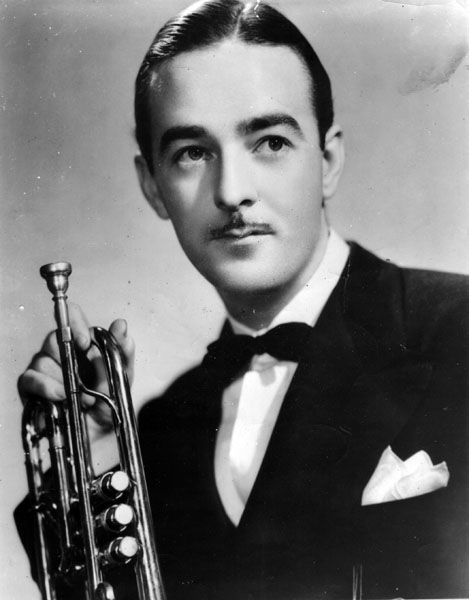Bobby Hackett: trumpeter, cornetist, guitarist
Robert Leo Hackett: born Jan. 31, 1915 in Providence, RI; died June 7, 1976 in Chatham, MA
- The son of a blacksmith and the sixth of nine children, Hackett quit school at 14. His first playing jobs were on guitar and violin. In the early 1930s, Bobby worked with Payson Re’s dance band on Cape Cod, and Billy Lossez’s hotel orchestra.
- Played with Pee Wee Russell and Teddy Roy in Boston in the mid 1930s, and led the band at the Theatrical Club in that city 1936-37.
- Moved to New York in 1937, playing with Joe Marsala and Eddie Condon, as well as leading his own group on 52nd street. In 1939, he formed his own big band, but it was not successful.
- Joined Horace Heidt band and, after a year, Glenn Miller, playing guitar and cornet. Recorded famous solo on Jerry Gray’s “String of Pearls.” He was later a member of the Casa Loma Orchestra in 1944-46, and the Benny Goodman Orchestra in 1962-63.
- Worked in studio orchestras at both NBC and ABC, and became known for his solos with the Jackie Gleason Orchestra 1953-55. He toured with Tony Bennett in the mid 1950s, and was later a member of the Benny Goodman Orchestra in 1962-63.
- Recorded the well-regarded albums Jazz Ultimate and Coast Concert with Jack Teagarden, and four volumes of Live at the Roosevelt Grill with Vic Dickenson and Dave McKenna.
- After moving to Cape Cod in 1971, Hackett played locally with McKenna, and toured with George Wein and Benny Goodman.

Bobby Hackett (Photo courtesy of Jack Bradley)
Jack Bradley on Bobby Hackett
During the late 1930s, Bobby Hackett was often referred to as “the new Bix,” a term which he was never comfortable with. His musical life was never the same after hearing Louis Armstrong as a kid in Providence.
Hackett was sometimes accused of being responsible for the increase in birth rate in the 1950s because of his way with romantic ballads on the records he made with Jackie Gleason.
Armstrong said of Hackett, “He’s wonderful to have playin’ with you — Bobby plays all them big notes and leaves out all that bebop-debop nonsense.” Hackett defined music just as neatly when he said, “Music should be pretty — you should hear and recognize the melody.” In a discussion of Hackett between Armstrong and Tony Bennett, Louis summed, “I’m the coffee, he’s the cream!” That statement is like a Hackett solo—short, eloquent and to the point.
